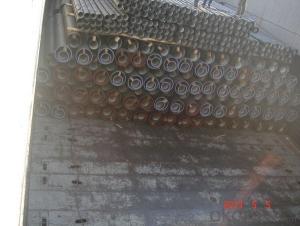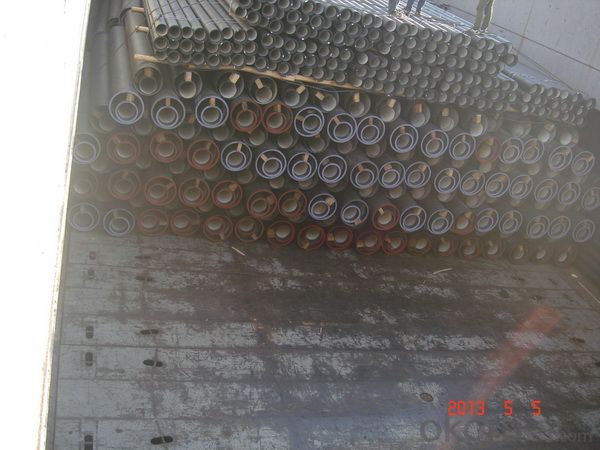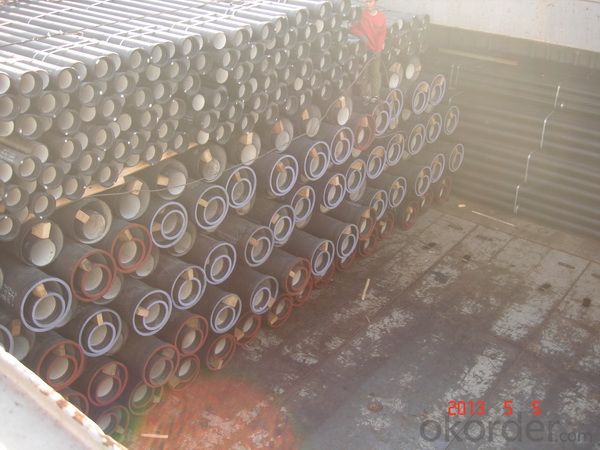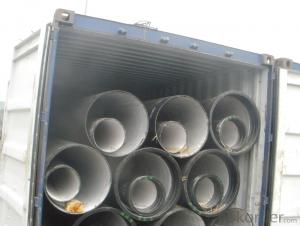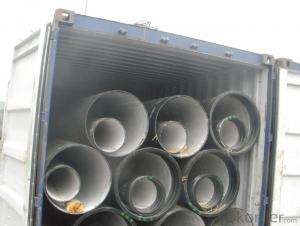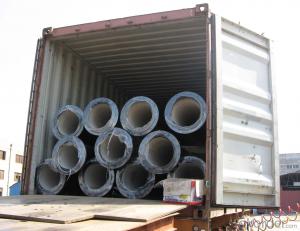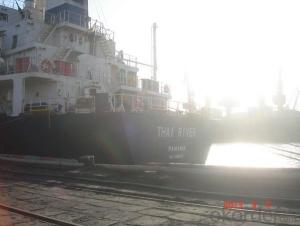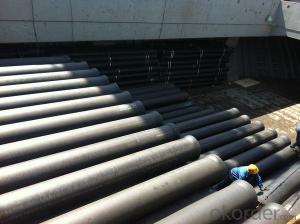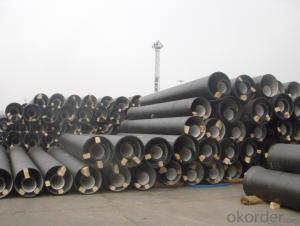DUCTILE IRON PIPES AND PIPE FITTINGS C CLASS DN1000
- Loading Port:
- Tianjin
- Payment Terms:
- TT OR LC
- Min Order Qty:
- 22 pc
- Supply Capability:
- 3000 pc/month
OKorder Service Pledge
OKorder Financial Service
You Might Also Like
Material : Ductile Cast Iron
Size Range : DN 80mm to DN 2000mm
Unit Effective Length : 6m or 5.7m
Manufacture Standard: ISO 2531:1998/ EN 545:2006/EN 598:2007
Annual capacity : 200,000 tons
Coating Exterior: Zinc 130g/m2 according to ISO 8179-1 and bitumen coating 70 microns.
Cement Interior: Portland Cement/ High Alumina Cement/ Sulphate Resisting Cement Lining according to ISO 4179
Special requirements on external coating and internal lining can be applied
We also provide accessories such as SBR/EPDM rubber gaskets, lubricant paste, pipe caps, PE sleeves, etc.
Additional Parts:
Each pipe is strictly inspected according to related standard to ensure permanently high performance.
Easy Installation at site and service free for life
Long Service Lifespan
Quotation will arrive you within 24hours once we get your inquiry.
We guarantee offering you a competitive price.
A copy of original inspection reports of pipes will be offered after shipment.
Photos of loading process will be sent to the customer after shipment effect.
We will follow-up the delivery progress after shipment effect and update to the customer on weekly basis.
- Q: Are ductile iron pipes suitable for use in geothermal applications?
- Yes, ductile iron pipes are suitable for use in geothermal applications. Geothermal systems involve harnessing the Earth's heat to generate energy or provide heating and cooling for buildings. Ductile iron pipes are known for their strength, durability, and corrosion resistance, all of which are vital qualities for geothermal applications. Geothermal systems often operate at high temperatures and pressures, and ductile iron pipes can withstand these conditions without compromising their structural integrity. They can handle the thermal expansion and contraction that occur in geothermal systems, ensuring a reliable and long-lasting piping solution. Furthermore, ductile iron pipes have excellent resistance to corrosion, making them well-suited for the potentially corrosive environment found in geothermal applications. This resistance ensures that the pipes will not degrade over time, maintaining the integrity of the system and minimizing the risk of leaks or failures. Additionally, ductile iron pipes have a smooth interior surface, which helps to minimize pressure loss and reduce energy consumption in geothermal systems. Their smoothness also reduces the likelihood of mineral deposits or scaling buildup, ensuring efficient and uninterrupted heat transfer. Overall, ductile iron pipes are a suitable choice for geothermal applications due to their strength, durability, corrosion resistance, thermal stability, and smooth interior surface. They provide a reliable and efficient piping solution that can withstand the demanding conditions of geothermal systems while ensuring long-term performance and minimal maintenance requirements.
- Q: What is the minimum pipe diameter of cast iron pipe?
- Nominal diameter of continuous grey cast iron pipe is 75~1200 mm, minimum 75 mm, maximum 1200 mm.
- Q: Are ductile iron pipes suitable for installation in areas with high soil compaction?
- Yes, ductile iron pipes are suitable for installation in areas with high soil compaction. Ductile iron pipes have high strength and durability, allowing them to withstand the pressure exerted by compacted soil. They can effectively resist external loads and provide long-term performance, making them a reliable choice for such areas.
- Q: Can ductile iron pipes be used for both water and sewage systems?
- Ductile iron pipes can serve for both water and sewage systems, owing to their remarkable strength and durability. Renowned for their exceptional mechanical properties, these pipes can endure the immense pressure and stress encountered in such systems. Furthermore, their resistance to corrosion renders them optimal for transporting both clean water and sewage. Consequently, ductile iron pipes emerge as a dependable and adaptable option for water and sewage systems, given their wide-ranging applications.
- Q: How long is the service life of the cast iron pipe, and the time of use of ductile iron pipes?
- When it comes to the service life of nodular cast iron, its maintenance is essential for its long service life. Then, the focus of the maintenance of ductile iron pipe is to pay special attention to, will affect the long-term use of ductile iron pipes, stable operation of socket, row, etc., we should make efforts to these aspects of the mouth without debris. Make sure that the rubber ring of the ductile iron pipe has been smashed with a rubber hammer, and it is not twisted or twisted, and it is uniformly stuck in the slot. Ductile iron pipe in the maintenance process, because of the pneumatic tube axis is buried into the ground, so in the face of a tilt angle of the time, we must be careful, if the resistance is too large, will not force the excavation, in order to prevent the distortion of the rubber ring.
- Q: Are ductile iron pipes suitable for underground applications?
- Indeed, underground applications are well-suited for ductile iron pipes. Renowned for their durability, strength, and resistance to corrosion, these pipes emerge as an excellent option for installations that lie beneath the surface. Their ability to withstand immense loads, ground shifts, and external pressure further solidifies their appropriateness for burial underground. Moreover, given the challenges associated with access and maintenance in underground scenarios, the fact that ductile iron pipes boast a lifespan of over 100 years becomes invaluable. In conclusion, the reliability and suitability of ductile iron pipes for underground applications are underscored by their robustness and longevity.
- Q: Are there any alternatives to ductile iron pipe for water distribution?
- There are various options available for water distribution besides ductile iron pipe. Some commonly used alternatives include: 1. PVC (Polyvinyl Chloride) Pipe: PVC pipe is frequently chosen for water distribution due to its affordability, durability, and resistance to corrosion. It is lightweight, easy to install, and requires minimal maintenance. 2. HDPE (High-Density Polyethylene) Pipe: HDPE pipe is a flexible and durable choice for water distribution. It is resistant to corrosion, chemicals, and UV rays, making it suitable for both aboveground and underground installations. HDPE pipe is also known for its leak-free joints and long lifespan. 3. PEX (Cross-linked Polyethylene) Pipe: PEX pipe, a flexible plastic pipe, is commonly utilized for water distribution in residential and commercial settings. It is recognized for its ability to withstand freezing, scaling, and corrosion. PEX pipe is easy to install, has fewer joints, and is highly durable. 4. Copper Pipe: Copper pipe has a long history of use in water distribution due to its exceptional resistance to corrosion and extended lifespan. Although it is more expensive than other alternatives, copper pipe is renowned for its reliability and ability to handle high pressure. 5. Steel Pipe: Steel pipe is a robust and durable option for water distribution, particularly in high-pressure scenarios. It can endure extreme temperatures and resist external loads. However, steel pipe is more costly and requires specialized installation techniques. When selecting an alternative to ductile iron pipe for water distribution, it is crucial to consider factors such as cost, durability, corrosion resistance, installation requirements, and specific project needs.
- Q: How are ductile iron pipes protected against erosion caused by high-velocity flow?
- Various methods and techniques are used to protect ductile iron pipes from erosion caused by high-velocity flow. One effective method involves applying protective coatings on the inner surface of the pipes. These coatings act as a barrier between the flowing water and the pipe material, minimizing the abrasive effects of the fast flow. Depending on the specific requirements of the application, coatings such as epoxy, polyurethane, or cement-mortar lining may be used. In addition, manufacturers often design the pipes with increased wall thickness in areas prone to erosion, such as bends or sections with high flow velocity. This additional thickness provides extra strength and resistance against erosion. Another technique used to safeguard ductile iron pipes from erosion is the implementation of flow control devices, such as flow deflectors or fittings that reduce velocity. These devices help redirect the flow and decrease its speed, thus minimizing the impact on the pipe walls. Regular maintenance and inspections are also vital to prevent erosion. By monitoring the condition of the pipes and identifying any early signs of erosion, appropriate measures can be taken to address the issue before it worsens. This may involve repairing or replacing damaged sections of the pipes and implementing erosion control measures like sediment filters or flow restrictors. Overall, a combination of protective coatings, design considerations, flow control devices, and proactive maintenance strategies are employed to ensure adequate protection of ductile iron pipes against erosion caused by high-velocity flow.
- Q: What does ductile iron pipe "ND200" mean?
- The tube is thin from the metal tube, and the outer diameter of the tube is almost the same as the inner diameter of the tube, so the average value of the outer diameter of the tube and the inner diameter of the pipe is called the diameter.
- Q: Can ductile iron pipe be used for hydroelectric power generation?
- Yes, ductile iron pipe can be used for hydroelectric power generation. Ductile iron pipes are known for their strength, durability, and resistance to corrosion, making them suitable for various applications including the transportation of water in hydroelectric power plants.
Send your message to us
DUCTILE IRON PIPES AND PIPE FITTINGS C CLASS DN1000
- Loading Port:
- Tianjin
- Payment Terms:
- TT OR LC
- Min Order Qty:
- 22 pc
- Supply Capability:
- 3000 pc/month
OKorder Service Pledge
OKorder Financial Service
Similar products
Hot products
Hot Searches
Related keywords
